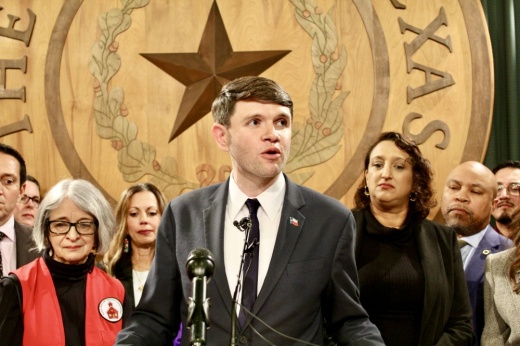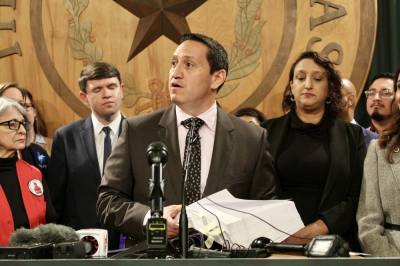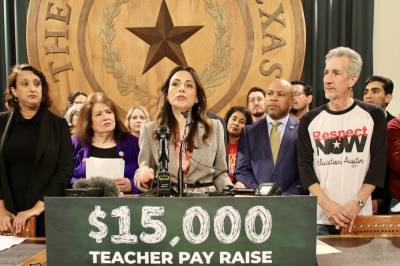Nearly 11.6% of teachers left their jobs at Texas public schools ahead of the 2021-22 school year, according to a report from the Texas Education Agency. That is over 42,000 teachers—the highest attrition rate since 2007-08, when the agency began collecting annual data.
More teachers are thinking about leaving their jobs than ever before, too. According to an August survey from the Texas State Teachers Association, a record 70% of teachers “seriously considered” quitting after the 2021-22 school year.
State Rep. James Talarico, D-Round Rock, filed House Bill 1548 in an attempt to change that. The bill, which is supported by the Texas House Democratic Caucus, would raise teacher salaries by $15,000 and increase pay for school support staff by 25%.
This would bring the minimum annual salary for Texas teachers to $48,660. During the current school year, classroom teachers, full-time librarians, full-time counselors and full-time registered nurses with less than one year of experience must receive at least $33,660 per year, the TEA website states.
Under the bill, the average teacher salary would be $73,887, making Texas the the seventh-best state for teacher pay, Democrats said. According to the National Education Association, Texas currently ranks 28th in the nation for average teacher pay.
“In Texas, it’s go big or go home. And it’s time, at this moment, to go big on teacher pay,” Talarico said at a Jan. 24 news conference.
Before becoming a lawmaker, Talarico taught language arts at Jeremiah Rhodes Middle School in San Antonio.
“I struggled to make ends meet, and my co-workers at Rhodes Middle School drove Ubers at night and sold their own blood plasma to make extra money,” Talarico said. “Now, 40% of Texas teachers work a second job just to pay the bills.”
Talarico was joined at the news conference by other members of the House Democratic Caucus, including state Reps. Trey Martinez Fischer, D-San Antonio; Gina Hinojosa, D-Austin; and Terry Meza, D-Irving. Many teachers and school board members, both current and retired, were present.
Texas educates approximately 10% of the nation’s students, but many districts have lost up to one-third of their teachers in recent years, according to Austin ISD Board President Arati Singh.
“This leads to bigger class sizes ... smaller course offerings and an increased likelihood that you have an uncertified teacher teaching your kids how to read,” Singh said.
This session, Texas lawmakers have an unprecedented $188 billion available as they create the state budget for 2024-25. This includes a nearly $33 billion surplus that is left over from the current biennium.
“With an unprecedented $33 billion budget surplus, we have at least 33 billion opportunities to improve our schools,” said Fischer, chair of the House Democratic Caucus, in a statement.
Lawmakers said that after raising salaries for all teachers by $15,000, the Legislature would likely have half of the surplus remaining to fund other initiatives.
The bill would also “sustainably and significantly reduce property taxes,” Singh said. The TEA partially funds schools based on attendance, while the rest of the money schools receive comes from local property taxes.
Texas currently has one of the highest property tax rates in the nation. Gov. Greg Abbott, Lt. Gov. Dan Patrick and Republican lawmakers have highlighted property tax reduction as a key priority for the session.
Talarico said he anticipates bipartisan support for the legislation. He told reporters he spoke with House Speaker Dade Phelan, R-Beaumont, last week about teacher pay and the overall condition of Texas schools. He plans to communicate with state senators and the governor’s office later in the session.







